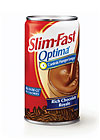
Meal replacements have always been great for a meal on the go or to help with weight management. In a world of super-sized meals, they provide a convenient way to control portions, offering a healthy snack or a complete meal in the range of 100 to 350 calories. Now they’re also touting terrific new tastes and high protein levels to help build lean muscle and support weight management efforts. In the past year, the combined categories of nutritional beverages and weight control drinks saw more than $600 million in annual sales. A new generation of dairy ingredients has been a part of the growth in these categories, helping manufacturers improve flavor and pack in more nutritious dairy protein.
First, let’s talk protein. Most meal replacements come in either 8- or 11-oz servings and include 10 to 20 grams of protein per serving. Many use several protein sources. The ENSURE Plus brand uses milk protein isolate (MPI) as the core protein and adds other proteins, including whey protein concentrate (WPC). The BOOST Nutritional Energy Drink relies solely on MPC for its protein source. The SLIM-FAST OPTIMA and HIGH PROTEIN MEAL ON-THE-GO start with fat-free milk and add other protein sources including milk protein concentrate (MPC). “Freshly produced skim milk powder from the United States contributes great taste and nutrition to these well-balanced meal replacement shakes,” according to Khalid Farooq, Ph.D., technical project manager, Slim-Fast. “These delicious and nutritious dairy-based shakes have been designed by enormous efforts of the Unilever Slim-Fast team. The Slim-Fast Optima Shake is proven to control hunger for up to four hours and is based on research, conducted over the last four years, as to how someone can feel full longer to help better manage between-meal hunger.”

Advances in filtration technology have helped make MPC and MPI available domestically. These ingredients offer superior flavor profiles, excellent protein nutritional quality and improved functionality, which may lead manufacturers to formulate with higher levels of milk proteins rather than caseinates or soy proteins. MPC is available in various protein levels. MPCs with 70% or greater protein, and MPI with a protein level approaching 90% are typically used in nutritional beverages. Several U.S. suppliers now offer dried MPCs and MPIs; many offer fluid ultrafiltered (UF) milk.
From a functional standpoint, milk protein ingredients derived from microfiltration of skim milk are still in their native state and have not undergone the changes in pH that occur with casein production. Thus, milk protein may provide superior flavor and water binding, gelation and viscosity-building capabilities. A current study, funded by DMI and the U.S. Dairy Export Council, is measuring core functional properties and evaluating sensory characteristics of domestic milk protein ingredients.
When it comes to flavor, milk proteins definitely deliver. The Ensure Plus shakes, with whey protein isolate as the primary protein, proclaim their “Terrific New Taste” on the label and come in four delicious flavors. The Ensure product also includes plant-based omega-3s. The new Bravo! Foods Breakfast Blenders combine low-fat milk with fruit, vanilla or cocoa for a breakfast on the go. These 100% milk aseptically packaged drinks have a 6-month shelf life and are “fortified with 50% more protein.” Also new on the market is Abbott’s Pediasure Nutripals nutritional drink in chocolate, vanilla and strawberry. This beverage is made with MPC and is targeted at elementary school children.
The same advantages that dairy proteins bring to other foods and beverages-superior flavor and functionality as well as support for maintaining a healthy weight, increasing satiety and building lean muscle-make them valuable additions to the growing meal replacement market.
For more information on meal replacements and other beverages featuring dairy proteins, visit www.innovatewithdairy.com. Technical Support Consultant Sharon Gerdes can be reached at 800/248-8829.